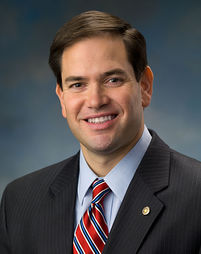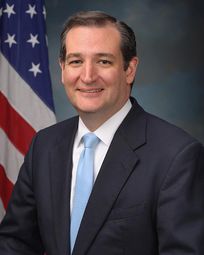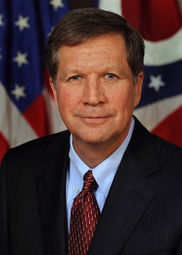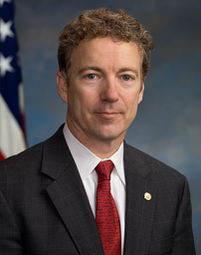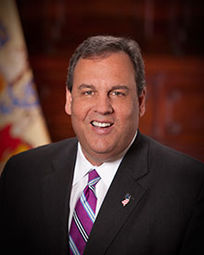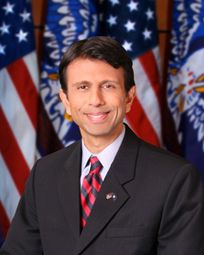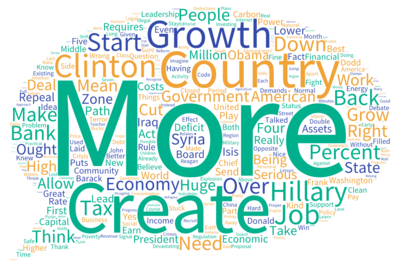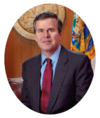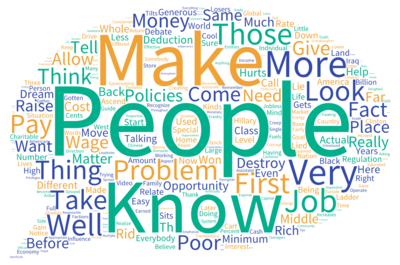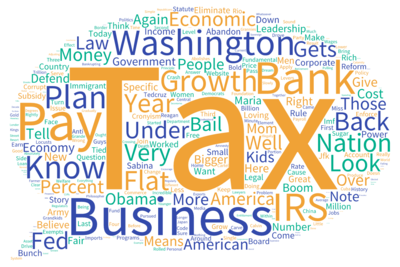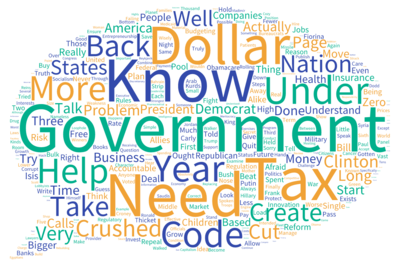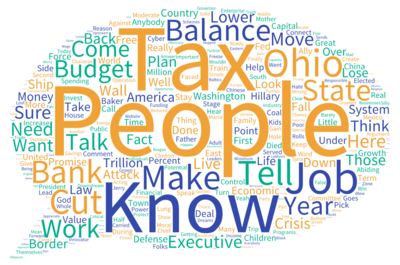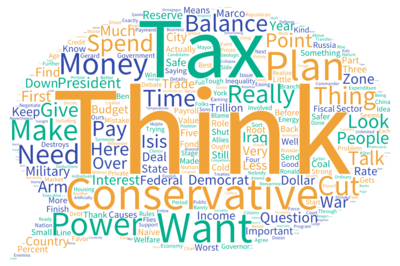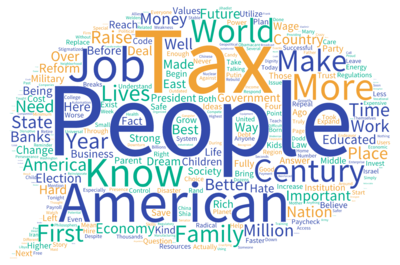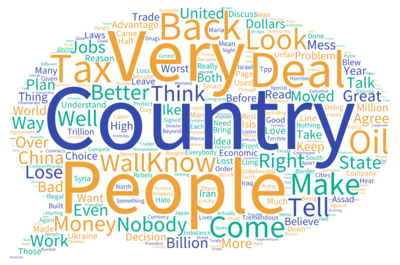Milwaukee, Wisconsin Fox Business/Wall Street Journal Republican debate (November 10, 2015)
![]() Ballotpedia's scope changes periodically, and this article type is no longer actively created or maintained. If you would like to help our coverage grow, consider donating to Ballotpedia.
Ballotpedia's scope changes periodically, and this article type is no longer actively created or maintained. If you would like to help our coverage grow, consider donating to Ballotpedia.
This article focuses exclusively on the fourth Republican debate hosted by the Fox Business Network and The Wall Street Journal on November 10, 2015. Click here to access Ballotpedia's full 2015-2016 presidential debate coverage. A schedule for Republican primary debates can be found below.
Ballotpedia's coverage of the fourth Republican debate—which took place November 10, 2015—includes an overview of the event's basic information, the results of our Insiders Poll, statistics and post-debate commentary written by guest writers and members of our senior writing staff. The debate consisted of two back-to-back halves. Polling data was used to determine which candidates participated in each segment. More information on participants and rules for inclusion can be found in the "Basic Information" tab below.
Basic Information
Date: November 10, 2015
Time: 7:00 pm and 9:00 pm EDT
Location: Milwaukee, Wisconsin
Venue: The Milwaukee Theater
Sponsors: Fox Business Network and The Wall Street Journal
Moderators:
- Primetime debate: Maria Bartiromo, Neil Cavuto, and Gerard Baker
- Undercard debate: Trish Regan, Sandra Smith & Gerald Seib
Rules for inclusion: Candidates were required to meet the following criteria in order to participate in the debate:[1]
| “ |
|
” |
Participants
9:00 pm debate
7:00 pm debate
Statistics
![]() Ballotpedia's scope changes periodically, and this article type is no longer actively created or maintained. If you would like to help our coverage grow, consider donating to Ballotpedia.
Ballotpedia's scope changes periodically, and this article type is no longer actively created or maintained. If you would like to help our coverage grow, consider donating to Ballotpedia.
This article analyzes the central themes of the Republican presidential debate held on November 10, 2015, in Milwaukee, Wisconsin. The transcript prepared by The Washington Post was used to measure candidate participation and audience engagement.[3]
To compare the statistics of this debate to the previous Republican debates, please see the analysis of topics and participation in the October 2015 CNBC Republican debate and the analysis of topics and participation in the September 2015 CNN Republican debate.
Segments
The fourth Republican presidential debate featured 17 unique discussion segments that mainly focused on economic issues. These discussion segments were measured by any shift in the theme of a discussion prompted by one of the moderators: Gerard Baker, Maria Bartiromo and Neil Cavuto.
- Minimum wage
- National debt and cutting federal spending
- Job creation
- Income inequality
- Media portrayal of candidates
- Economic impact of illegal immigration
- Technological advancement causing the loss of traditional jobs
- Entitlements
- Regulations on businesses
- Taxes
- The Trans-Pacific Partnership trade deal (TPP)
- National security and foreign affairs
- The financial crisis and bailouts
- Hillary Clinton
- Tax loopholes and businesses leaving the country
- Climate change
- Closing statements
The FOX Business Network debate focused principally on economic issues, although the discussion did deviate from the primary subject matter in three out of the 17 segments, which instead discussed the media, foreign affairs and Hillary Clinton.[4]
Overall participation
Participation in a segment was defined by a substantive comment related to the segment's topic. Jokes and attempts to gain permission from a moderator to speak were not considered participatory speech acts. In some instances, candidates who participated in a segment diverted from the prompted topic.
Candidate participation by topic was well-balanced during the debate. Each candidate participated in six or seven discussion segments. The moderators frequently introduced a discussion segment but only asked one candidate for his or her opinion on the subject. Seven of the 17 discussion segments involved only one candidate. Excluding the closing statements, the discussion segments on taxes and foreign affairs involved the greatest number of candidates participating. Only Kasich was left out of the segment on taxes, despite his best efforts to address the issue, while Cruz was left out of the discussion on national security and foreign affairs.[3]
Candidate participation by speaking time
Politico reported on the number of minutes each candidate spoke during the debate.[5] Ted Cruz spoke for the longest amount of time, nearly two minutes more than John Kasich, who occupied the next largest chunk of time. Jeb Bush and Ben Carson were the only two candidates to speak for less than 10 minutes.
Candidate participation by segment vs. speaking time
The amount of time a candidate spoke did not necessarily align with the number of issues he or she covered during the debate. For example, despite the fact that Ted Cruz discussed one fewer topic than Jeb Bush, Cruz spoke for nearly four minutes more than Bush did.
Audience engagement
Audience engagement was measured by noting the instances of applause, cheering or laughter in The Washington Post's transcript. Footage from the debate was consulted where the text was ambiguous regarding which candidate the audience was responding to. Multiple expressions of positive audience engagement during one speech act were marked as a single instance of audience engagement. Paul and Trump received the warmest response from the crowd, while Kasich failed to resonate with the audience. The chart below shows Fiorina with a small number of distinct positive audience engagements, but in actuality the audience responded well to her. She often received multiple instances of applause during her lengthy discussions of topics, but because they took place in a single speech act, they were only counted once.
Despite Trump's high number of positive reactions from the audience, he also drew boos from the crowd when he questioned why Fiorina "keep[s] interrupting everybody." Kasich was the only other candidate to be booed by the audience, when he tried explaining how he would distinguish which banks and people to bail out in a financial crisis.[3]
Candidate speech analysis
|
|
|
|
|
|
|
|
See also
- Presidential candidates, 2016
- Presidential election, 2016/Polls
- 2016 presidential candidate ratings and scorecards
- Presidential election, 2016/Straw polls
Footnotes
- ↑ Fox Business, "FOX Business Network and the Wall Street Journal Present Two GOP Presidential Primary Debates on November 10th," October 27, 2015
- ↑ Note: This text is quoted verbatim from the original source. Any inconsistencies are attributable to the original source.
- ↑ 3.0 3.1 3.2 The Washington Post, "Who said what and what it meant: The 4th GOP debate, annotated," November 10, 2015
- ↑ FOX Business, "Where You Can Watch and Participate in the GOP Debate," November 10, 2015
- ↑ Politico, "Who got the most time?" November 10, 2015
Ballotpedia's Insiders Poll
Insiders: Rubio Has Another Good Debate
November 10, 2015 (Updated on November 11, 2015 at 12:07 pm EST)
By James A. Barnes
In what is becoming a pattern, Florida Sen. Marco Rubio had another good debate. And after underwhelming performances in the last two Republican encounters, former Florida Gov. Jeb Bush turned in a debate that heartened his supporters. In a survey of more than 120 Republican and Democratic political Insiders surveyed by Ballotpedia, more than half judged Rubio to be the “biggest winner” of the November 10 Republican presidential debate in Milwaukee conducted by Fox Business and The Wall Street Journal.
Ballotpedia surveyed 122 Republican and Democratic strategists, pollsters, media consultants, activists, lobbyists and allied interest groups operatives after the debate concluded: 73 Republicans responded and 49 Democrats participated. This survey was conducted anonymously to encourage candor from Insiders. As political professionals, Insiders frequently view events like debates through a similar prism—at least on the main result: three out of five GOP Insiders, 60 percent, and a strong plurality of Democratic Insiders, 46 percent, said Rubio was the “biggest winner.”
“He once again showed that he can win a debate while retaining likability,” said one GOP Insider. Rubio’s “message is compelling, well-delivered, and capable of winning primaries,” said another. “Not his strongest debate, but was once again stronger than all others on that stage,” said a third GOP Insider.
Another 17 percent of the GOP Insiders thought that Bush was the “biggest winner” of the Milwaukee event. To Bush’s fans, it was a reassuring performance that is something they can rally around and one that they hope will change the negative narrative swirling around his campaign. “He had the most riding on a strong performance and he delivered one,” maintained one GOP Insider. “At a minimum, he bought himself more time to reset and advance.” Another observed, “Jeb was the real Jeb tonight, the leader Floridians remember. Will calm the stories and gird them for the grinding campaigning to come.” A third GOP said that Bush “showed a pulse, lost the Bush-speak and he stood up straight.”
Former Hewlett-Packard CEO Carly Fiorina was judged by nine percent of the Republican Insiders to have won the night. “Her specifics on foreign policy were a devastating contrast to the bumbling of [Donald] Trump,” said one GOP Insider. “Striking a chord on big government and crony capitalism,” maintained GOP Influential.
Democratic Insiders also saw Rubio as the Republican who continues to rise. “Once again he was assertive, knowledgeable and earned the right to be taken seriously,” said one Democratic Insider. “He was polished and smooth,” echoed another Democrat. And a third shared an assessment that becoming a something of refrain among Democrats: “Marco Rubio was the bright star on the stage. He presented a compelling, albeit conservative, vision for the future. He would be a tough out for Democrats if he survives the primaries.”
Some Democratic Insiders felt that developer Donald Trump was the “biggest winner” because his position on immigration—which they strongly disagree with—stood out on the Republican stage in Milwaukee. “While Trump was off base on his immigration position, his view is aligned with at least 40 percent of Republicans which should allow him to stay in first place,” noted one Democratic Insider. “He locked in himself as the anti-immigration candidate,” echoed another.
Democrats also thought Texas Sen. Ted Cruz had a good night. “Nobody ran away with this debate, but Cruz is very good in this format, as is Rubio,” said one Democratic influential. “But Cruz is getting well-positioned to take advantage of the [GOP] environment should [Ben] Carson and, or, Trump falter.
Kasich, biggest loser
On the other side of the ledger, a majority, 54 percent, of the Republican Insiders thought that Ohio Gov. John Kasich was the “biggest loser” of the debate. Many gave him low marks on style. “Kasich was unrelentingly annoying,” said one GOP Insider. “Petulant is not a winning strategy,” echoed another. “He was irritating and condescending even when he was right,” added a third. And some Republicans also felt that Kasich may be at odds with the base of his party. “Further alienated GOP base with multiple answers that were out of step with most conservatives,” maintained a GOP influential. This survey was conducted anonymously to encourage candor from the Insiders.
Bush and developer Donald Trump were distant runner-ups to Kasich for having a bad night: 15 percent said Bush was “biggest loser” in the Milwaukee debate, and another 11 percent gave Trump that award. For Bush, who was the frontrunner early on in the GOP nominating contest, Republican Insiders felt that the former Florida governor needed a better night to revive his campaign. “He did OK, but OK is a big loss for him, ” maintained one GOP Insider. “He needed more than a couple of decent answers and his whining about time is weak sauce,” said another.
Trump was criticized for his style. “Everyone else is maturing except Trump,” said one GOP Insider. “His bluster now appears to be merely a lack of sophistication.” Another judged, “Other than insulting Carly [Fiorina], barely there.”
Democrats were divided on who the biggest loser of the Milwaukee debate was: 27 percent said Bush and 25 percent said Kasich. “Bush just isn’t brash enough to stand out in this crowd,” said one Democratic Insider. “Bush is over,” declared another. “It's time to think about the cool things he can do instead.”
On Kasich, Democrats wonder whether the most moderate sounding candidate can thrive among Republican rank-and-file primary voters. “He is officially the [Jon] Huntsman of the [2016] cycle,” observed one Democratic Insider. “Just can’t break through,” said another.
Democrats also gave a low score to child neurosurgeon Ben Carson and 18 percent said he was the “biggest loser” of the GOP debate. “The guy doesn't know what to say on policy,” said one Democratic Insider. “He keeps showing he has no reason to be on that stage and his complete ignorance of foreign policy and economic policy is astounding,” echoed another.
Rubio helped most, followed by Fiorina and Cruz
Another more nuanced way to assess the Republican contenders’ performance is to ask Insiders whether the candidates helped themselves in the debate, hurt themselves, or neither. Looking at the helped-hurt ratio as measured by the responses of Republican Insiders shows that four of the GOP White House hopefuls had a positive night, two were somewhat mixed, and two were clearly negative.
Not surprising, Rubio had the best ratio, 11-to-1 positive: 79 percent of the Republican Insiders said Rubio helped himself in the Milwaukee debate and only seven percent said he hurt himself (the rest said neither). Fiorina and Cruz were both four-to-one positive: Fiorina, 60 percent helped, 15 percent hurt; Cruz 55 percent helped, 13 percent hurt. Bush had a 2-to-1 positive ratio, 48 percent helped, 23 percent hurt.
The two mixed scores were given to Kentucky Sen. Rand Paul and Carson: 37 percent of the GOP Insiders said Paul helped himself the debate, and 40 percent said he hurt himself. Carson’s rating dipped more into negative territory, but not overwhelmingly: 23 percent of the Republicans said the doctor helped himself, but 34 percent said he hurt himself in this debate.
Trump and Kasich fared poorly in the eyes of the Republican Insiders: only 12 percent said Trump helped himself, while 45 percent said he hurt himself. Kasich earned a 9-to-1 negative rating: eight percent said he helped himself, while 75 percent said he hurt himself. Little wonder he was judged by GOP Insiders to be the “biggest loser” of the debate.
Republicans think Christie belongs in the main event
And among the candidates who weren’t included, which one would Republicans liked to have been included in the main debate? New Jersey Gov. Chris Christie. Two-thirds of the GOP Insiders said they would have liked to seen him on the stage in Milwaukee. “Main stage lost something without him,” said one GOP Insider. “Kasich tried to take advantage of Christie not being there—swing and a miss.” Another Republican declared, “He belongs on the big stage. None of the others really do. It is time to end the kiddie table.”
James A. Barnes is a senior writer for Ballotpedia and co-author of the forthcoming 2016 edition of the Almanac of American Politics. He has conducted elite opinion surveys for National Journal, CNN and the on-line polling firm, YouGov. This Insiders survey was conducted November 10-11, 2015.
Debate Commentary
The columns below were authored by guest columnists and members of Ballotpedia's senior writing staff. The opinions and views belong to the authors.
Bush Was Better, But Is That Enough?
November 11, 2015
By Karlyn Bowman
Karlyn Bowman, a widely respected analyst of public opinion, is a senior fellow and research coordinator at the American Enterprise Institute, a conservative think tank in Washington, D.C.
A new McClatchy/Marist poll released earlier this week revealed that 58 percent of those surveyed said the more they hear about Jeb Bush the less they like him. Only 32 percent said the more they hear, the more they like him. His marks were worse than any of the other candidates the pollsters asked about, including Trump.
In fairness to Bush, the poll was taken after his weak performance in the CNBC debate. Will his performance in the November 11 GOP Milwaukee debate change those responses? It is hard to erase a negative impression in opinions and negative impressions of him that have been growing. He did well last night but probably not well enough to undo the growing admiration audiences seem to have for Rubio and Cruz, who are the most eloquent debaters. Carly Fiorina is a sharp debater, too, but her interventions seemed to lack the common touch that Rubio projects so well.
Each candidate had strong moments in the main debate, and Chris Christie outshone the others in the early evening contest. The winner in Milwaukee seemed to be Fox and the Wall Street Journal, news organizations that produced a riveting and substantive exchange.
Not ‘Spin City’ but ‘Segue City’
November 11, 2015
By David Kusnet
David Kusnet is a former chief speechwriter for former President Bill Clinton. He is the senior writer and a principal at the Podesta Group, a government relations and public relations firm in Washington, D.C.
If you had to sum up last night’s debate in two words, these wouldn’t be the title of that late-90s sitcom, “Spin City.” Instead, the tagline would be “Segue City,” an appellation that might appeal most to students of public rhetoric or campaign management.
With less aggressive—some would say intrusive—questioning than the CNBC debate in Boulder, Colorado last night’s event in Milwaukee hosted by Fox Business and The Wall Street Journal allowed the candidates to segue into segments of their stump speeches. The downside: fewer memorable moments that recast the race. The upside: more extended exchanges about public policy issues.
The most effective performances were those in which candidates responded in the moment to an opening provided by a panelist or adversary or segued seamlessly from the subjects they were asked to address to the points they were prepared to make. While such pivots don’t produce vivid video clips, they do leave the audience with the sense that a candidate is a capable debater with a coherent viewpoint and a clear understanding of the issues. In contrast, candidates who don’t begin their answers by appearing to address the questions they were asked run the risk of seeming scripted, inauthentic or even unprepared to be president.
Among the few seemingly spontaneous exchanges was Carly Fiorina’s response to Donald Trump’s statement that he “got to know [Putin] very well because we were both on ‘60 Minutes.’ ” Instead, Fiorina claimed, she had encountered the Russian leader “not in a green room for a show but in a private meeting.”
Meanwhile, several extended exchanges among the candidates resulted in relatively unscripted moments that may have helped several contenders consolidate their support among voters who share their views. On immigration, Trump tangled with John Kasich and Jeb Bush, each of whom, appealing to morality and practicality, questioned whether the United States can or should deport millions of undocumented immigrants. While Kasich and Bush scored points, so did Trump who, in a rare reference to policy details, recalled President Dwight Eisenhower’s deportation of “illegal immigrants” during the 1950’s.
Similarly, Marco Rubio’s exchange with Rand Paul on national security allowed each candidate to define himself – Rubio as relatively hawkish, Paul as often anti-interventionist. Intervening in the argument, Ted Cruz uncorked one of the most memorable lines of the evening, directed at Paul’s equation of defense spending with domestic social programs: “You think defending this nation is expensive, try not defending it. That's a lot more expensive.”
Still, most of the debate consisted of set-pieces, with the most skillful answers flowing from the questions. For instance, when asked by Maria Bartiromo how we would “deal with” diminished economic growth, as forecast by the International Monetary Fund, Cruz began by citing economic growth statistics for the past seven years before reciting his economic program.
In contrast, in response to a question from Neil Cavuto about which “government-paid benefits you would take back,” Rubio discussed his family background and the American dream without saying whether he would or would not cut social programs.
Of course, set-pieces without contexts are appropriate closing statements, and closing statements can be what audiences remember best. Ben Carson excelled with a statement that followed the classic structure of sermons and stump speeches: first, bring the audience down and then lift your listeners up. Thus, he began by declaring: “In the two hours of this -- of this debate, five people have died from drug-related deaths, $100 million has been added to our national debt…” And he concluded: “This is a narrative that we can change, not we the Democrats, not we the Republicans, but we the people of America, because there is something special about this nation, and we must embrace it…”
Consistency Counts
November 11, 2015
By James A. Barnes
James A. Barnes is a senior writer for Ballotpedia. He is the founding editor of the National Journal Political Insiders Poll and is a co-author of the 2016 edition of the Almanac of American Politics.
In the 2016 Republican presidential debates one thing we may be learning is that consistency counts: specifically, the consistently solid performances that Florida Sen. Marco Rubio has turned in over four GOP encounters.
Ballotpedia surveys Republican and Democratic strategists, pollsters, media consultants, activists, lobbyists and allied interest groups operatives at the conclusion of each debate. One of the questions put to the party Insiders is: “On balance, do you think the following candidates helped themselves with this debate, hurt themselves, or neither?” (Each candidate in the main debate is rated on this question.)
In every one of the four Republican debates, GOP Insiders have scored Rubio with the highest positive ratio of helping-versus-hurting himself. In the first Republican debate in Columbus, Ohio, on August 6, 73 percent of the GOP Insiders said the Florida Senator helped himself and only four percent said he hurt himself (the rest of the GOP Insiders said “neither”); an 18-to-1 positive ratio. In the September 16 debate at the Ronald Reagan Presidential Library, Rubio’s helped-hurt ratio was 21-to-1, 84 percent of the GOP Insiders said he helped himself and only four percent said he hurt himself. In the debate at the University of Colorado in Boulder, Rubio had a 17-to-1 positive ratio; 85 percent helped, four percent hurt. And in the Milwaukee debate, Rubio’s helped hurt ratio “slipped” to 11-to-1, 79 percent of the Republicans said he helped himself, and seven percent said he’d hurt himself.
At times, other Republican candidates at times have also scored very well on this dimension. Ohio Gov. John Kasich had an 11-to-1 positive ration in the Columbus debate and Texas Sen. Ted Cruz had a 12-to-1 positive ratio in the Boulder debate. Carly Fiorina had an otherworldly 98-1 positive ratio when she made her debut in the “main event” at the Reagan Presidential Library. But Rubio has always come in first in this measurement.
From the outset of the debates, Rubio has given answers to questions that are articulate, future-oriented, generally upbeat and occasionally compelling. He has avoided initiating attacks on his rivals, but he’s not reluctant to counter-punch as he effectively demonstrated in the Boulder debate when former Florida Gov. Jeb Bush criticized his Senate voting record, or in the Milwaukee debate when he tussled with Kentucky Sen. Rand Paul on the U.S. role in the world. Rubio has set a debating standard that many Republicans now expect from him, and so far, he’s delivered.
And coming from a first-term Senator who is new to the national political stage, that kind of consistency is probably reassuring to many of his GOP establishment elders who know that whoever their nominee is, that person will likely face Democrat Hillary Clinton—an experienced and battle-scared competitor—in the general election.
If Rubio stumbles in an upcoming debate, it will be interesting to see the reaction within the GOP. Having made such a good impression in the first four debates, will he get a pass for having an “off-night,” or will his campaign be hobbled because he failed to meet the expectations Republicans now have for him in these face-offs?
Ironically, Jeb Bush was probably hurt by debate expectations. The former two-term Florida governor started off as the establishment favorite and front-runner in the GOP contest; and front-runners are held to certain expectations in debates. They are supposed to be able to deflect attacks, avoid missteps and generally float above fray of their opponents who have to battle to get attention. But Donald Trump, the billionaire developer who’s starred on a reality TV show, dominated the first debate. Bush didn’t do a bad job in Columbus, but with his podium right next to Trump’s on the stage, the celebrity’s gusto and occasional outrageousness, seemed to diminish Bush.
Bush truly did flounder in the third debate when Rubio turned his own attack against him and Christie got the better of him in an exchange over regulating fantasy football. During the first round of questions in the Milwaukee debate, Bush was visibly irritated when Gov. John Kasich interrupted an inquiry posed to him. And Bush groused that he had been shortchanged on time in the previous debate. But for much of the rest of the Milwaukee debate, Bush was reluctant to interject himself in the freewheeling exchanges that other candidates were having. As one Democratic Insider who watched the debate aptly put it, “Bush just isn’t brash enough to stand out in this crowd.”
Bush’s problem is that he has his father’s manners and not his mother’s mouth. President H. W. Bush is known for his usually reserved demeanor, while Barbara Bush can be outspoken, as in 2013, when reflecting on the possibility of another Bush presidency she told Today show host Matt Lauer, “There are other people out there that are very qualified and we’ve had enough Bushes.”
Jeb could use a few crackling debate performances to help avert that admonition.
Republican Debate Schedule
Click the schedule to return back to the top of the page.
See also
- Presidential debates (2015-2016)
- Presidential candidates, 2016
- Presidential election, 2016/Polls
- 2016 presidential candidate ratings and scorecards
- Presidential election, 2016/Straw polls
Footnotes




